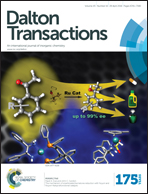Role(s) of TMA in polymerization†
Abstract
Quenched-flow data for propene polymerization with rac-Me2Si(2-Me-4-Ph-1-indenyl)2ZrCl2/MAO support a picture where removal of MAO qualitatively changes the kinetic profile from a mainly enthalpic to a mainly entropic barrier. DFT studies suggest that a not previously recognized singly-bridged end-on coordination mode of Me6Al2 to catalytically active centers may be kinetically relevant as a resting state. In contrast, the more traditional doubly-bridged complex of Me3Al is proposed to be more relevant to chain transfer to cocatalyst.


 Please wait while we load your content...
Please wait while we load your content...